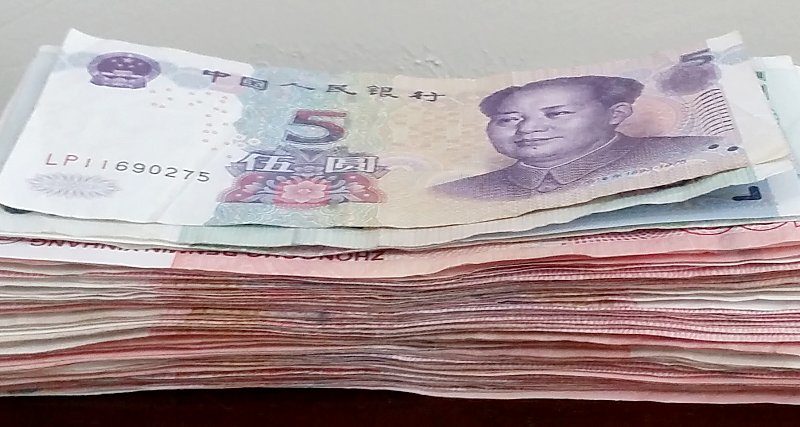It’s So Freaking Hard to Send Money Out of China!!!
I work as an English teacher in China. Since my job comes with a free apartment + utilities + subsidised canteen, I don’t really spend a lot of my salary.
There’s really not that much to buy here either. And I can’t accumulate possessions because I only have a 23 Kg luggage allowance when I eventually return home.
I haven’t found much to spend entertainment wise either. Our city is cold in Winter and this fabulous looking bar street is closed for winter:

I tried dating (women will no doubt find a way to spend my cash) but East China seems to be a dating wasteland. After all, we’re really near Japan and their population is actually shrinking.
So the result is that each month I accumulate more and more RMB:

When I first started my job my school told me that they would open a bank account for me at ABC (Agricultural Bank of China).
Most schools will open a bank account for you. They tend to allocate you to a specific bank as apparently they can save money by paying every employee through the same bank.
This is different to the UK where you’re usually free to get your salary paid directly into a bank account of your choosing, unless (weirdly) you actually work for a bank. In which case you often have to have an account with your employer.
Anyway, I started my contract in September. It’s now the end of January. I still don’t have my ABC account.
I got fed up with waiting with my school/their bank’s lack of action, and opened my own account with ICBC.
To their credit ICBC were really great. With their limited English and my limited Mandarin we managed to get a bank account opened for me. They just needed to see my passport and a copy of my job contract. I also needed a China mobile phone number to link to the account.
I got a bit confused when they asked me to make a 6 digit pin number. In the UK we use 4 digits.
So far so good. It only took me an hour to open the account. It cost me just 5 RMB to open the account. For that I can pay money in and get a Union Pay card. That’s allowed me to put AliPay on my phone, which is the preferred way for Chinese people to pay for stuff in shops these days. Hell, even beggars on the metro accept AliPay e-payments!!! As do the semi-legit fruit stalls outside our school’s gates.
Without a Union Pay card I felt I was living in the 1990’s and might as well have been writing checks to pay for my groceries.
I was also worried that without a bank account I was taking a huge security risk. At one point I had the equivalent of over $3000 in cash in my room. That wasn’t a good thing. Especially as our teacher dormitory building’s door locks are, er, rubbish.
So I finally got a bank account.
That makes it easy to send money out of China right?
No!
In fact it’s getting really hard to send money out of China. So this is worth bearing in mind. Especially if you need money to pay off student loan debts or for other purposes.
I have tried various ways to send money out of China, with mixed results:
- I tried buying some bitcoins with the intention of selling them again on an exchange which allowed me to send money back into my UK bank account. But that was a non starter. As of late 2017 the Chinese government had effectively banned bitcoin purchases by Chinese residents. Of course there may be some loopholes but as a foreigner they’re unlikely to be of any value to me.
- I thought about buying my own small business’s software products using my Chinese bank card then waiting for the money to be paid by the payment processor into my UK bank account. A genius plan right? Wrong! There’s a 10% sales tax in China plus my payment processor charges 7% commission. So that just wouldn’t be cost effective.
- Wire Transfer from my ICBC Chinese bank account. OK this is successful and I’ve got it to work. You just need to take your home bank account’s bank name, IBAN, SWIFT/BIC and postal address with your passport and they will fill in the necessary paperwork on your behalf. The process is agonisingly slow, especially the first time you do it and if the bank teller hasn’t done it before. Thankfully the money flow itself is really quick. I’ve done it a couple of times now and it’s taken less than 48 hours for the money to appear in my UK bank account.
The downside to Wire Transfers? They’re expensive! I got charged 200 RMB a time and I could only send a maximum of $500 home in a single, daily transaction. Of course there’s also a certain amount shaved off my currency exchanges. So while Wire Transfers work, sending $500 home at a time loses roughly 7% of the value of the cash you send.
Ouch!
I think there is a way round the high fees by bunching up $500 daily foreign currency purchases. To be able to do this though you’re gonna need a bank teller with pretty decent English. You might also need to show proof of your income and taxes paid in China. This isn’t always that easy – for example my school never gives me payslips. And this is a big university with 30,000 students. You’ll probably get even less from the payroll department of a small language school.
BTW don’t go out on the street and buy foreign currency notes. It doesn’t work that way. In China paper money is not the same as digital money and paper money is not easy to send out of the country.
I haven’t tried:
- Western Union or MoneyGram. These can work quite well apparently. The downside is that you need a money mule at the other end to go and pick up cash on your behalf. I’m not a huge fan of this as I don’t like to get other people involved in my financial affairs.
- Taking cash out of China. Of course you can take cash out of China. But just be aware of the limits. You can only take the equivalent or 1 or 2 month’s salary in RMB notes out of China. You can take up to $5000 in foreign currency. But if you do this then you’re going to lose big on the exchange rate, and you might fall victim to a fake money scam. Well the overall message here is that you can’t take your entire year’s salary in RMB notes out of China. For one it’s illegal, for another because the biggest note is just 100 RMB then you’re going to need a suitcase for your annual salary, especially if you’re as frugal as I am.
Many of my peers take cash out of China. But they’re all lucky in that they have second homes in Thailand or Vietnam, so they can go home more often than I can. They also have Asian wives who they can give half of their cash to when they leave China.
- Paypal. You can apparently open a Paypal account in China then send money from it to your home Paypal account. Sadly I can’t do this as I got an unfair Paypal ban back in 2014 as and it’s useless trying to argue with their idiotic support monkeys.
- Getting a Chinese resident to send money out of China. AliPay allows Chinese citizens to send money overseas using Wire Transfer. I think the annual limit per person is $50,000. Sadly due to the usual discrimination against foreigners it’s something only Chinese citizens are allowed to do. You could get somebody to do it on your behalf. But again it’s getting other people involved in your financial affairs.
- Getting the school to pay me by wire transfer. I’m not sure if this is possible, but I’ve heard about it. When I’m looking for my next contract I might try to insist on this. I suggest you try it as well, especially if you need money for student loan repayments or a mortgage.
- Using my Union Pay card overseas. Apparently this is a good one. Just fly back home and use your Union Pay card to withdraw money in your own currency. Union Pay cards are accepted in a lot more countries these days. Apparently they’re accepted by the UK’s LINK network for example. This effectively means all UK ATM’s will accept Union Pay cards. I guess there is a daily limit on this but over a month or two you should be able to withdraw a large amount of your store up salary. Union Pay cards are also usually valid for a long time – mine expires in 10 years. Watch out for your passport expiration date because if the bank notices your passport has expired then your Chinese bank account linked to it might stop working.
So that’s my rant about the difficulty in sending money home from China. I guess it’s a bit of a first world problem. But after all we have flown 1000’s of miles to work hard and we expect to get paid for it. We do also have commitments at home and it doesn’t seem reasonable to expect us to spend 100% of our salary in China itself.
By the way, it’s VERY easy to send money TO China. But if you’re intending to work in China (or already there) then bear in mind that when you do the math of converting a Chinese salary into USD/GBP or EUR then you’ll have to factor in the problems in taking money out of China.
These problems will only get worse for us as China cracks down on money laundering while doing nothing to help us foreign residents move our money freely between countries.
End of rant.
Had the same problems sending money out of China? Found a loophole? Post your moans below.



